Supermarket Industry: Meeting Stakeholder Requirements in 5 Years
VerifiedAdded on 2023/01/11
|9
|3083
|49
Report
AI Summary
This report analyzes the evolving supermarket industry, focusing on how it must adapt to meet the diverse requirements of its stakeholders over the next five years. It examines the impact of e-commerce, changing customer behaviors, and technological advancements on supermarket operations. The report highlights the importance of understanding customer needs through market research, personalized experiences, and digital integration. It also addresses the concept of sustainability, employee training, and automation. Furthermore, the report discusses how supermarkets have responded to the challenge of "Feeding the Nation," particularly during times of crisis, such as the COVID-19 pandemic, by adapting to supply chain disruptions, leveraging e-commerce, and collaborating to ensure access to essential goods. It emphasizes the importance of government support, employee dedication, and the adoption of crisis management approaches to maintain service and meet customer needs during difficult times. The report also discusses the role of supermarkets in the community, and how the industry has risen to the occasion to serve the nation.

ASSIGNMENT 1
Paraphrase This Document
Need a fresh take? Get an instant paraphrase of this document with our AI Paraphraser
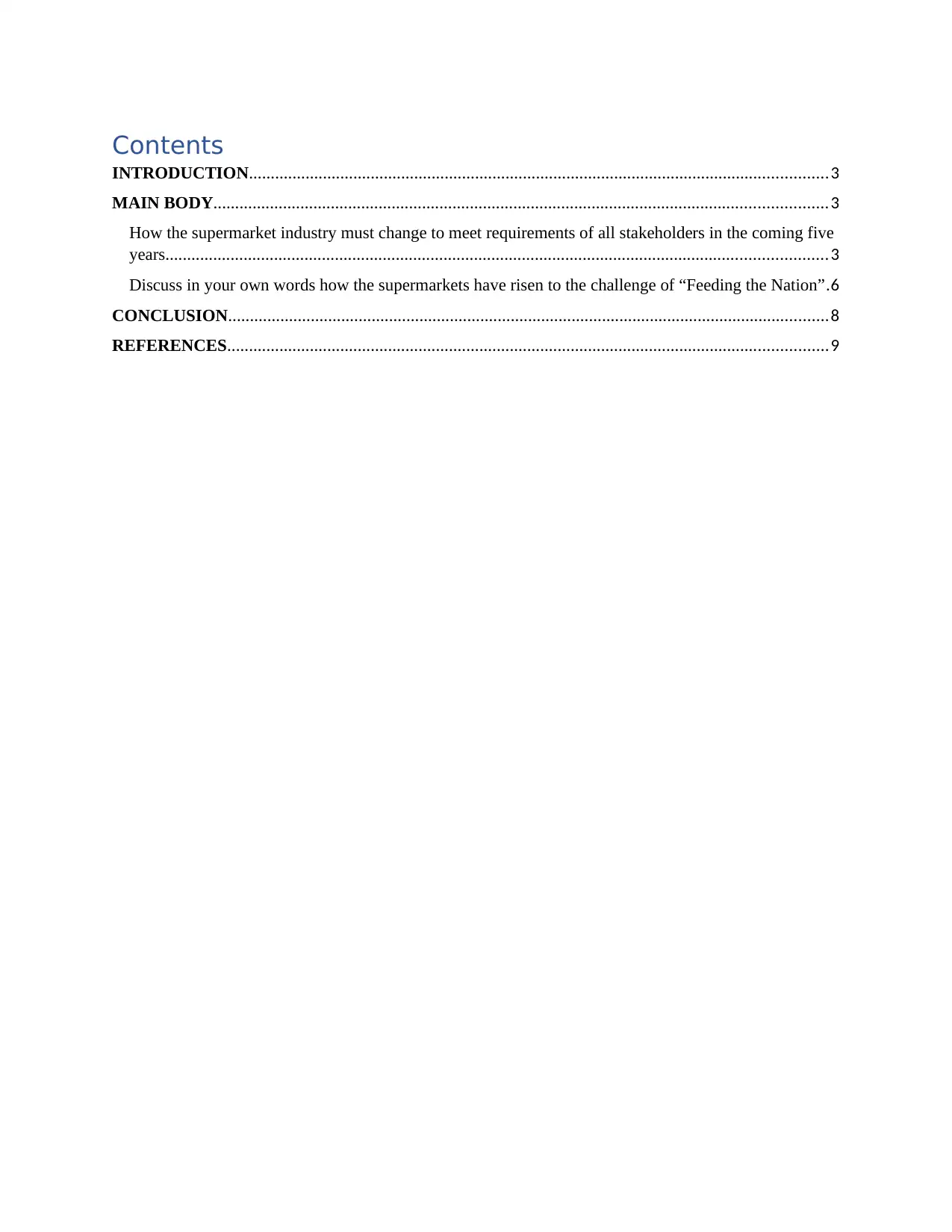
Contents
INTRODUCTION.....................................................................................................................................3
MAIN BODY.............................................................................................................................................3
How the supermarket industry must change to meet requirements of all stakeholders in the coming five
years........................................................................................................................................................3
Discuss in your own words how the supermarkets have risen to the challenge of “Feeding the Nation”.6
CONCLUSION..........................................................................................................................................8
REFERENCES..........................................................................................................................................9
INTRODUCTION.....................................................................................................................................3
MAIN BODY.............................................................................................................................................3
How the supermarket industry must change to meet requirements of all stakeholders in the coming five
years........................................................................................................................................................3
Discuss in your own words how the supermarkets have risen to the challenge of “Feeding the Nation”.6
CONCLUSION..........................................................................................................................................8
REFERENCES..........................................................................................................................................9
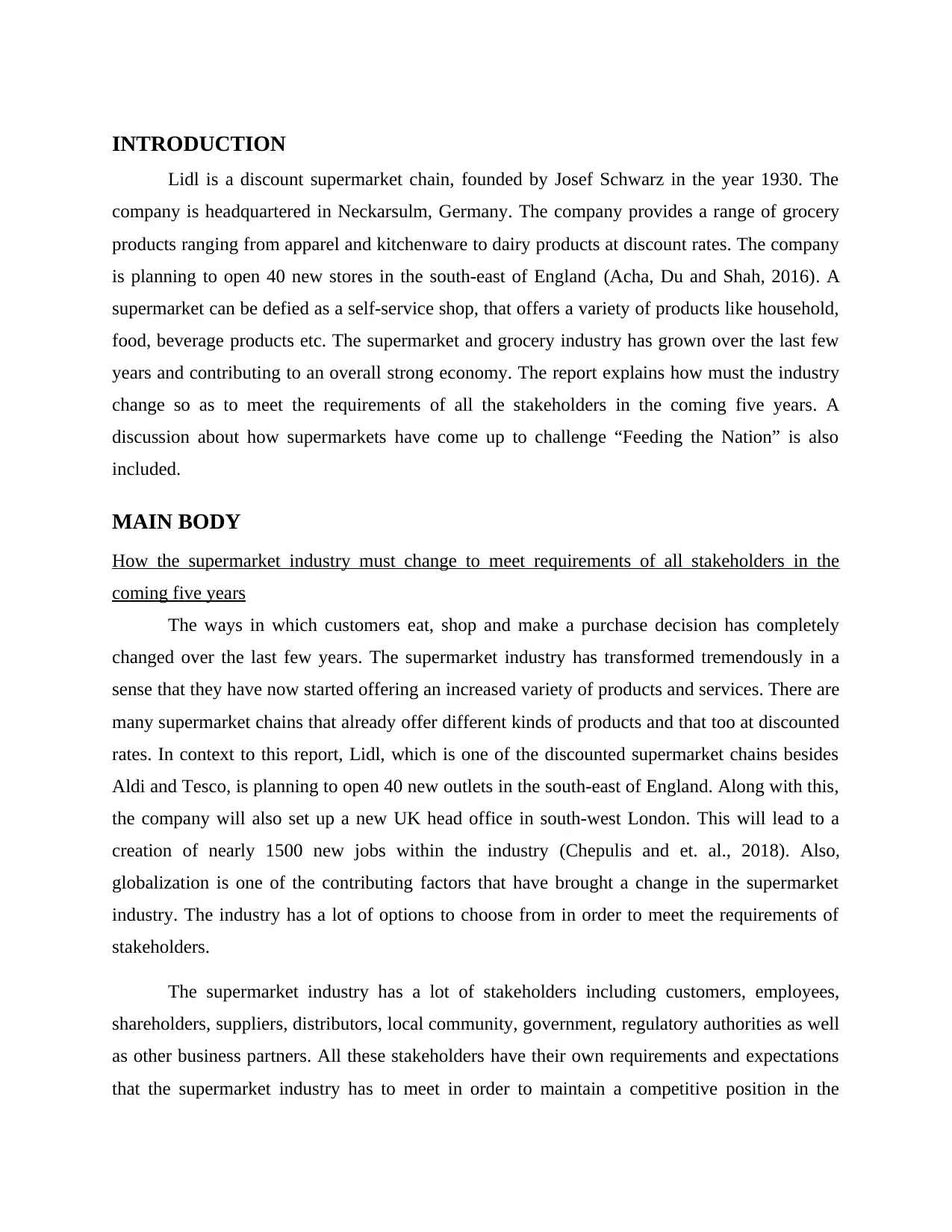
INTRODUCTION
Lidl is a discount supermarket chain, founded by Josef Schwarz in the year 1930. The
company is headquartered in Neckarsulm, Germany. The company provides a range of grocery
products ranging from apparel and kitchenware to dairy products at discount rates. The company
is planning to open 40 new stores in the south-east of England (Acha, Du and Shah, 2016). A
supermarket can be defied as a self-service shop, that offers a variety of products like household,
food, beverage products etc. The supermarket and grocery industry has grown over the last few
years and contributing to an overall strong economy. The report explains how must the industry
change so as to meet the requirements of all the stakeholders in the coming five years. A
discussion about how supermarkets have come up to challenge “Feeding the Nation” is also
included.
MAIN BODY
How the supermarket industry must change to meet requirements of all stakeholders in the
coming five years
The ways in which customers eat, shop and make a purchase decision has completely
changed over the last few years. The supermarket industry has transformed tremendously in a
sense that they have now started offering an increased variety of products and services. There are
many supermarket chains that already offer different kinds of products and that too at discounted
rates. In context to this report, Lidl, which is one of the discounted supermarket chains besides
Aldi and Tesco, is planning to open 40 new outlets in the south-east of England. Along with this,
the company will also set up a new UK head office in south-west London. This will lead to a
creation of nearly 1500 new jobs within the industry (Chepulis and et. al., 2018). Also,
globalization is one of the contributing factors that have brought a change in the supermarket
industry. The industry has a lot of options to choose from in order to meet the requirements of
stakeholders.
The supermarket industry has a lot of stakeholders including customers, employees,
shareholders, suppliers, distributors, local community, government, regulatory authorities as well
as other business partners. All these stakeholders have their own requirements and expectations
that the supermarket industry has to meet in order to maintain a competitive position in the
Lidl is a discount supermarket chain, founded by Josef Schwarz in the year 1930. The
company is headquartered in Neckarsulm, Germany. The company provides a range of grocery
products ranging from apparel and kitchenware to dairy products at discount rates. The company
is planning to open 40 new stores in the south-east of England (Acha, Du and Shah, 2016). A
supermarket can be defied as a self-service shop, that offers a variety of products like household,
food, beverage products etc. The supermarket and grocery industry has grown over the last few
years and contributing to an overall strong economy. The report explains how must the industry
change so as to meet the requirements of all the stakeholders in the coming five years. A
discussion about how supermarkets have come up to challenge “Feeding the Nation” is also
included.
MAIN BODY
How the supermarket industry must change to meet requirements of all stakeholders in the
coming five years
The ways in which customers eat, shop and make a purchase decision has completely
changed over the last few years. The supermarket industry has transformed tremendously in a
sense that they have now started offering an increased variety of products and services. There are
many supermarket chains that already offer different kinds of products and that too at discounted
rates. In context to this report, Lidl, which is one of the discounted supermarket chains besides
Aldi and Tesco, is planning to open 40 new outlets in the south-east of England. Along with this,
the company will also set up a new UK head office in south-west London. This will lead to a
creation of nearly 1500 new jobs within the industry (Chepulis and et. al., 2018). Also,
globalization is one of the contributing factors that have brought a change in the supermarket
industry. The industry has a lot of options to choose from in order to meet the requirements of
stakeholders.
The supermarket industry has a lot of stakeholders including customers, employees,
shareholders, suppliers, distributors, local community, government, regulatory authorities as well
as other business partners. All these stakeholders have their own requirements and expectations
that the supermarket industry has to meet in order to maintain a competitive position in the
⊘ This is a preview!⊘
Do you want full access?
Subscribe today to unlock all pages.

Trusted by 1+ million students worldwide
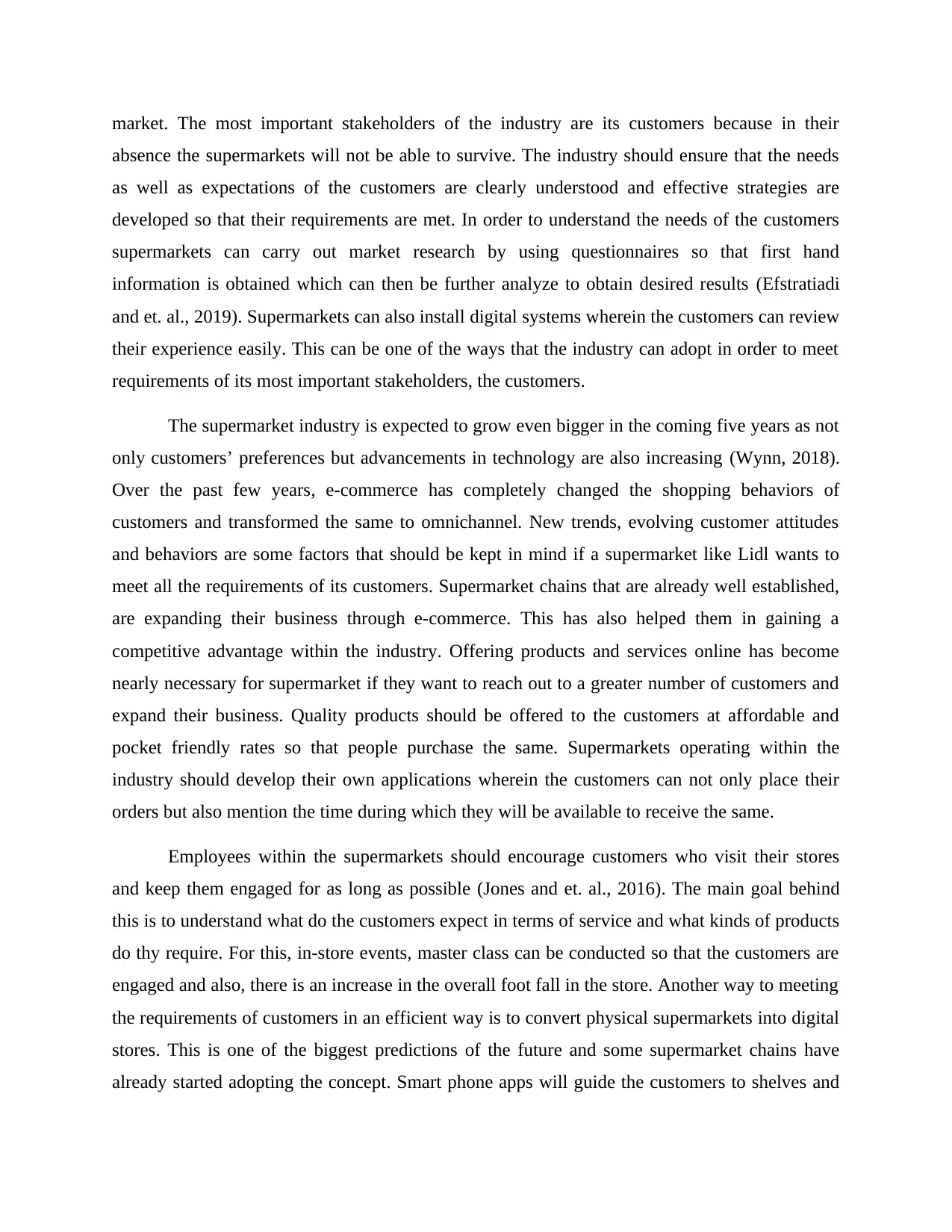
market. The most important stakeholders of the industry are its customers because in their
absence the supermarkets will not be able to survive. The industry should ensure that the needs
as well as expectations of the customers are clearly understood and effective strategies are
developed so that their requirements are met. In order to understand the needs of the customers
supermarkets can carry out market research by using questionnaires so that first hand
information is obtained which can then be further analyze to obtain desired results (Efstratiadi
and et. al., 2019). Supermarkets can also install digital systems wherein the customers can review
their experience easily. This can be one of the ways that the industry can adopt in order to meet
requirements of its most important stakeholders, the customers.
The supermarket industry is expected to grow even bigger in the coming five years as not
only customers’ preferences but advancements in technology are also increasing (Wynn, 2018).
Over the past few years, e-commerce has completely changed the shopping behaviors of
customers and transformed the same to omnichannel. New trends, evolving customer attitudes
and behaviors are some factors that should be kept in mind if a supermarket like Lidl wants to
meet all the requirements of its customers. Supermarket chains that are already well established,
are expanding their business through e-commerce. This has also helped them in gaining a
competitive advantage within the industry. Offering products and services online has become
nearly necessary for supermarket if they want to reach out to a greater number of customers and
expand their business. Quality products should be offered to the customers at affordable and
pocket friendly rates so that people purchase the same. Supermarkets operating within the
industry should develop their own applications wherein the customers can not only place their
orders but also mention the time during which they will be available to receive the same.
Employees within the supermarkets should encourage customers who visit their stores
and keep them engaged for as long as possible (Jones and et. al., 2016). The main goal behind
this is to understand what do the customers expect in terms of service and what kinds of products
do thy require. For this, in-store events, master class can be conducted so that the customers are
engaged and also, there is an increase in the overall foot fall in the store. Another way to meeting
the requirements of customers in an efficient way is to convert physical supermarkets into digital
stores. This is one of the biggest predictions of the future and some supermarket chains have
already started adopting the concept. Smart phone apps will guide the customers to shelves and
absence the supermarkets will not be able to survive. The industry should ensure that the needs
as well as expectations of the customers are clearly understood and effective strategies are
developed so that their requirements are met. In order to understand the needs of the customers
supermarkets can carry out market research by using questionnaires so that first hand
information is obtained which can then be further analyze to obtain desired results (Efstratiadi
and et. al., 2019). Supermarkets can also install digital systems wherein the customers can review
their experience easily. This can be one of the ways that the industry can adopt in order to meet
requirements of its most important stakeholders, the customers.
The supermarket industry is expected to grow even bigger in the coming five years as not
only customers’ preferences but advancements in technology are also increasing (Wynn, 2018).
Over the past few years, e-commerce has completely changed the shopping behaviors of
customers and transformed the same to omnichannel. New trends, evolving customer attitudes
and behaviors are some factors that should be kept in mind if a supermarket like Lidl wants to
meet all the requirements of its customers. Supermarket chains that are already well established,
are expanding their business through e-commerce. This has also helped them in gaining a
competitive advantage within the industry. Offering products and services online has become
nearly necessary for supermarket if they want to reach out to a greater number of customers and
expand their business. Quality products should be offered to the customers at affordable and
pocket friendly rates so that people purchase the same. Supermarkets operating within the
industry should develop their own applications wherein the customers can not only place their
orders but also mention the time during which they will be available to receive the same.
Employees within the supermarkets should encourage customers who visit their stores
and keep them engaged for as long as possible (Jones and et. al., 2016). The main goal behind
this is to understand what do the customers expect in terms of service and what kinds of products
do thy require. For this, in-store events, master class can be conducted so that the customers are
engaged and also, there is an increase in the overall foot fall in the store. Another way to meeting
the requirements of customers in an efficient way is to convert physical supermarkets into digital
stores. This is one of the biggest predictions of the future and some supermarket chains have
already started adopting the concept. Smart phone apps will guide the customers to shelves and
Paraphrase This Document
Need a fresh take? Get an instant paraphrase of this document with our AI Paraphraser
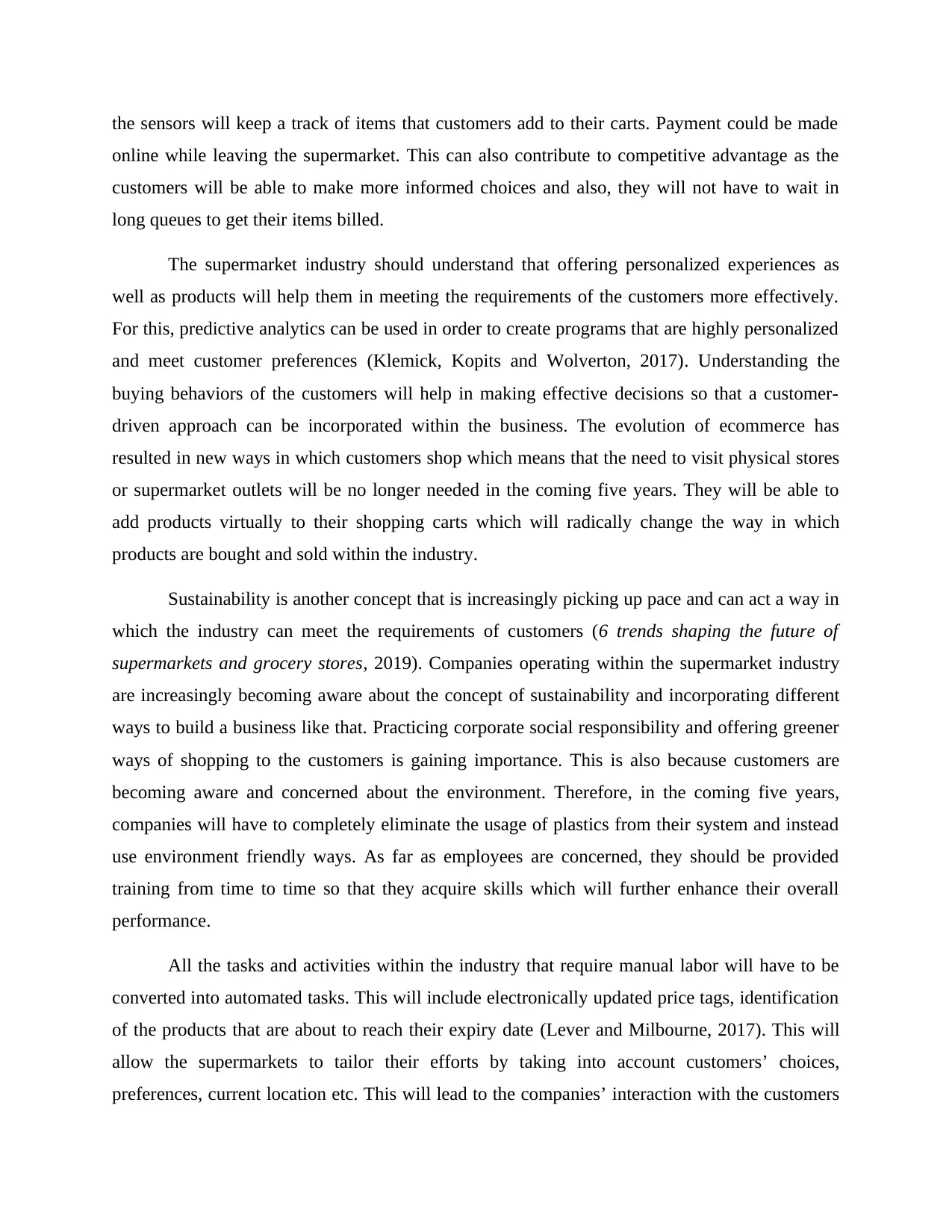
the sensors will keep a track of items that customers add to their carts. Payment could be made
online while leaving the supermarket. This can also contribute to competitive advantage as the
customers will be able to make more informed choices and also, they will not have to wait in
long queues to get their items billed.
The supermarket industry should understand that offering personalized experiences as
well as products will help them in meeting the requirements of the customers more effectively.
For this, predictive analytics can be used in order to create programs that are highly personalized
and meet customer preferences (Klemick, Kopits and Wolverton, 2017). Understanding the
buying behaviors of the customers will help in making effective decisions so that a customer-
driven approach can be incorporated within the business. The evolution of ecommerce has
resulted in new ways in which customers shop which means that the need to visit physical stores
or supermarket outlets will be no longer needed in the coming five years. They will be able to
add products virtually to their shopping carts which will radically change the way in which
products are bought and sold within the industry.
Sustainability is another concept that is increasingly picking up pace and can act a way in
which the industry can meet the requirements of customers (6 trends shaping the future of
supermarkets and grocery stores, 2019). Companies operating within the supermarket industry
are increasingly becoming aware about the concept of sustainability and incorporating different
ways to build a business like that. Practicing corporate social responsibility and offering greener
ways of shopping to the customers is gaining importance. This is also because customers are
becoming aware and concerned about the environment. Therefore, in the coming five years,
companies will have to completely eliminate the usage of plastics from their system and instead
use environment friendly ways. As far as employees are concerned, they should be provided
training from time to time so that they acquire skills which will further enhance their overall
performance.
All the tasks and activities within the industry that require manual labor will have to be
converted into automated tasks. This will include electronically updated price tags, identification
of the products that are about to reach their expiry date (Lever and Milbourne, 2017). This will
allow the supermarkets to tailor their efforts by taking into account customers’ choices,
preferences, current location etc. This will lead to the companies’ interaction with the customers
online while leaving the supermarket. This can also contribute to competitive advantage as the
customers will be able to make more informed choices and also, they will not have to wait in
long queues to get their items billed.
The supermarket industry should understand that offering personalized experiences as
well as products will help them in meeting the requirements of the customers more effectively.
For this, predictive analytics can be used in order to create programs that are highly personalized
and meet customer preferences (Klemick, Kopits and Wolverton, 2017). Understanding the
buying behaviors of the customers will help in making effective decisions so that a customer-
driven approach can be incorporated within the business. The evolution of ecommerce has
resulted in new ways in which customers shop which means that the need to visit physical stores
or supermarket outlets will be no longer needed in the coming five years. They will be able to
add products virtually to their shopping carts which will radically change the way in which
products are bought and sold within the industry.
Sustainability is another concept that is increasingly picking up pace and can act a way in
which the industry can meet the requirements of customers (6 trends shaping the future of
supermarkets and grocery stores, 2019). Companies operating within the supermarket industry
are increasingly becoming aware about the concept of sustainability and incorporating different
ways to build a business like that. Practicing corporate social responsibility and offering greener
ways of shopping to the customers is gaining importance. This is also because customers are
becoming aware and concerned about the environment. Therefore, in the coming five years,
companies will have to completely eliminate the usage of plastics from their system and instead
use environment friendly ways. As far as employees are concerned, they should be provided
training from time to time so that they acquire skills which will further enhance their overall
performance.
All the tasks and activities within the industry that require manual labor will have to be
converted into automated tasks. This will include electronically updated price tags, identification
of the products that are about to reach their expiry date (Lever and Milbourne, 2017). This will
allow the supermarkets to tailor their efforts by taking into account customers’ choices,
preferences, current location etc. This will lead to the companies’ interaction with the customers
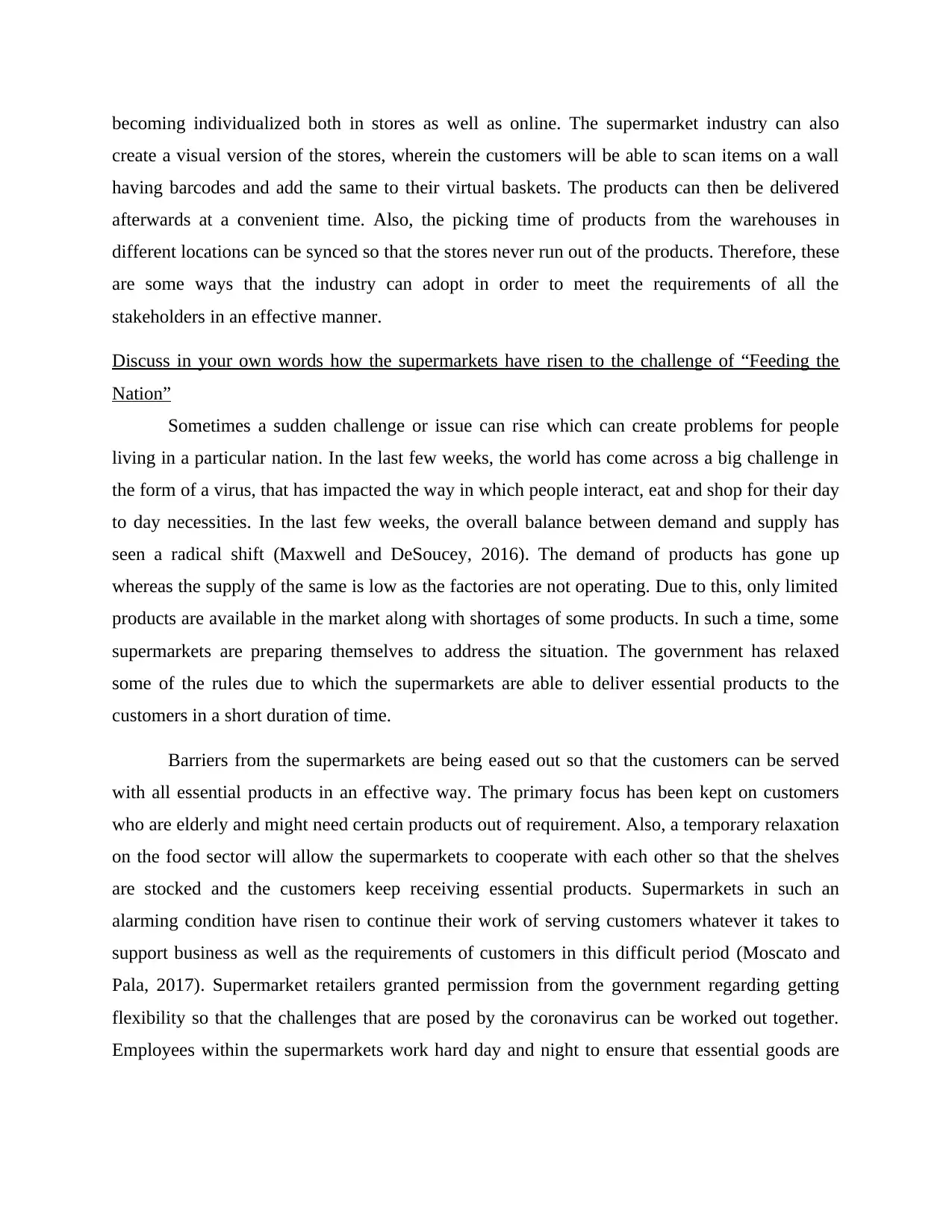
becoming individualized both in stores as well as online. The supermarket industry can also
create a visual version of the stores, wherein the customers will be able to scan items on a wall
having barcodes and add the same to their virtual baskets. The products can then be delivered
afterwards at a convenient time. Also, the picking time of products from the warehouses in
different locations can be synced so that the stores never run out of the products. Therefore, these
are some ways that the industry can adopt in order to meet the requirements of all the
stakeholders in an effective manner.
Discuss in your own words how the supermarkets have risen to the challenge of “Feeding the
Nation”
Sometimes a sudden challenge or issue can rise which can create problems for people
living in a particular nation. In the last few weeks, the world has come across a big challenge in
the form of a virus, that has impacted the way in which people interact, eat and shop for their day
to day necessities. In the last few weeks, the overall balance between demand and supply has
seen a radical shift (Maxwell and DeSoucey, 2016). The demand of products has gone up
whereas the supply of the same is low as the factories are not operating. Due to this, only limited
products are available in the market along with shortages of some products. In such a time, some
supermarkets are preparing themselves to address the situation. The government has relaxed
some of the rules due to which the supermarkets are able to deliver essential products to the
customers in a short duration of time.
Barriers from the supermarkets are being eased out so that the customers can be served
with all essential products in an effective way. The primary focus has been kept on customers
who are elderly and might need certain products out of requirement. Also, a temporary relaxation
on the food sector will allow the supermarkets to cooperate with each other so that the shelves
are stocked and the customers keep receiving essential products. Supermarkets in such an
alarming condition have risen to continue their work of serving customers whatever it takes to
support business as well as the requirements of customers in this difficult period (Moscato and
Pala, 2017). Supermarket retailers granted permission from the government regarding getting
flexibility so that the challenges that are posed by the coronavirus can be worked out together.
Employees within the supermarkets work hard day and night to ensure that essential goods are
create a visual version of the stores, wherein the customers will be able to scan items on a wall
having barcodes and add the same to their virtual baskets. The products can then be delivered
afterwards at a convenient time. Also, the picking time of products from the warehouses in
different locations can be synced so that the stores never run out of the products. Therefore, these
are some ways that the industry can adopt in order to meet the requirements of all the
stakeholders in an effective manner.
Discuss in your own words how the supermarkets have risen to the challenge of “Feeding the
Nation”
Sometimes a sudden challenge or issue can rise which can create problems for people
living in a particular nation. In the last few weeks, the world has come across a big challenge in
the form of a virus, that has impacted the way in which people interact, eat and shop for their day
to day necessities. In the last few weeks, the overall balance between demand and supply has
seen a radical shift (Maxwell and DeSoucey, 2016). The demand of products has gone up
whereas the supply of the same is low as the factories are not operating. Due to this, only limited
products are available in the market along with shortages of some products. In such a time, some
supermarkets are preparing themselves to address the situation. The government has relaxed
some of the rules due to which the supermarkets are able to deliver essential products to the
customers in a short duration of time.
Barriers from the supermarkets are being eased out so that the customers can be served
with all essential products in an effective way. The primary focus has been kept on customers
who are elderly and might need certain products out of requirement. Also, a temporary relaxation
on the food sector will allow the supermarkets to cooperate with each other so that the shelves
are stocked and the customers keep receiving essential products. Supermarkets in such an
alarming condition have risen to continue their work of serving customers whatever it takes to
support business as well as the requirements of customers in this difficult period (Moscato and
Pala, 2017). Supermarket retailers granted permission from the government regarding getting
flexibility so that the challenges that are posed by the coronavirus can be worked out together.
Employees within the supermarkets work hard day and night to ensure that essential goods are
⊘ This is a preview!⊘
Do you want full access?
Subscribe today to unlock all pages.

Trusted by 1+ million students worldwide
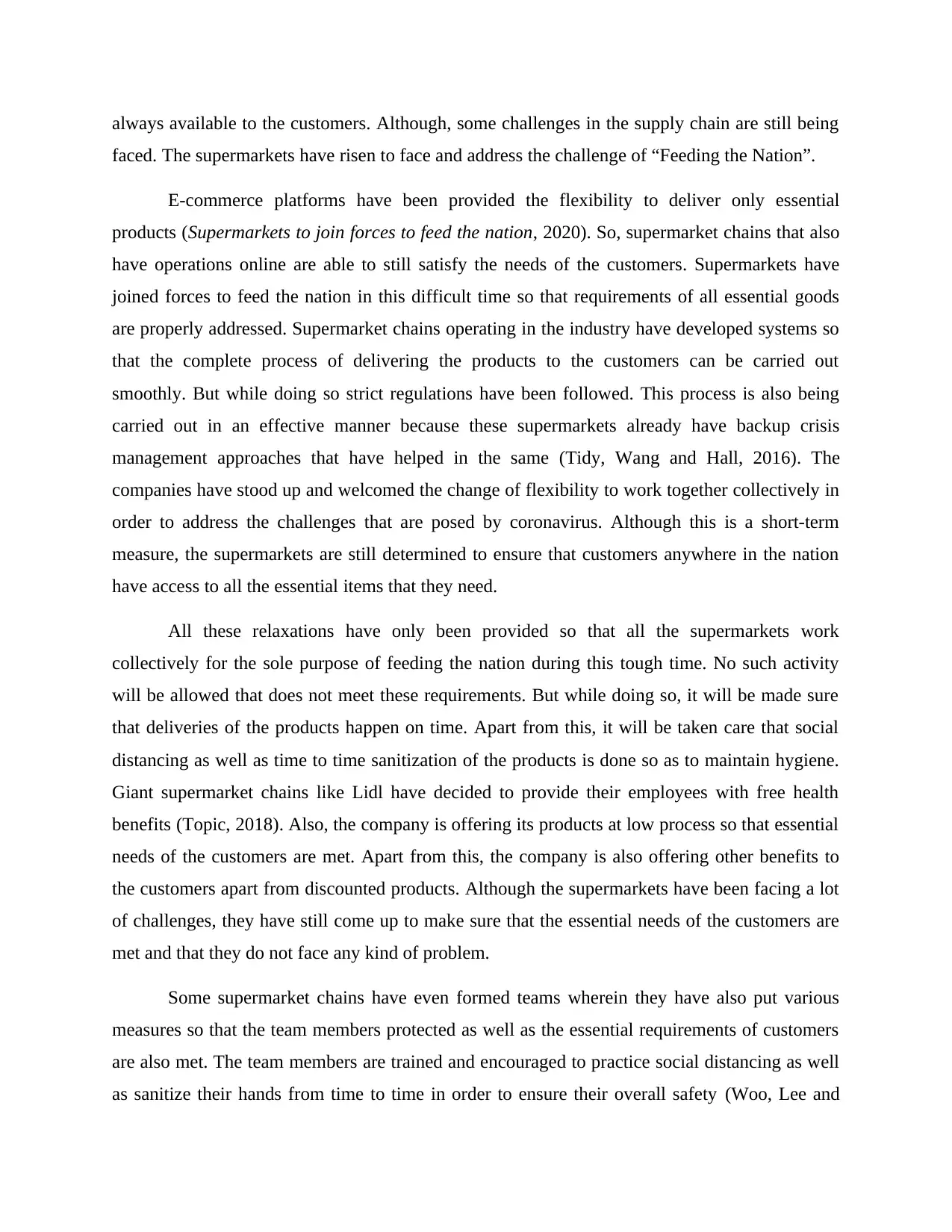
always available to the customers. Although, some challenges in the supply chain are still being
faced. The supermarkets have risen to face and address the challenge of “Feeding the Nation”.
E-commerce platforms have been provided the flexibility to deliver only essential
products (Supermarkets to join forces to feed the nation, 2020). So, supermarket chains that also
have operations online are able to still satisfy the needs of the customers. Supermarkets have
joined forces to feed the nation in this difficult time so that requirements of all essential goods
are properly addressed. Supermarket chains operating in the industry have developed systems so
that the complete process of delivering the products to the customers can be carried out
smoothly. But while doing so strict regulations have been followed. This process is also being
carried out in an effective manner because these supermarkets already have backup crisis
management approaches that have helped in the same (Tidy, Wang and Hall, 2016). The
companies have stood up and welcomed the change of flexibility to work together collectively in
order to address the challenges that are posed by coronavirus. Although this is a short-term
measure, the supermarkets are still determined to ensure that customers anywhere in the nation
have access to all the essential items that they need.
All these relaxations have only been provided so that all the supermarkets work
collectively for the sole purpose of feeding the nation during this tough time. No such activity
will be allowed that does not meet these requirements. But while doing so, it will be made sure
that deliveries of the products happen on time. Apart from this, it will be taken care that social
distancing as well as time to time sanitization of the products is done so as to maintain hygiene.
Giant supermarket chains like Lidl have decided to provide their employees with free health
benefits (Topic, 2018). Also, the company is offering its products at low process so that essential
needs of the customers are met. Apart from this, the company is also offering other benefits to
the customers apart from discounted products. Although the supermarkets have been facing a lot
of challenges, they have still come up to make sure that the essential needs of the customers are
met and that they do not face any kind of problem.
Some supermarket chains have even formed teams wherein they have also put various
measures so that the team members protected as well as the essential requirements of customers
are also met. The team members are trained and encouraged to practice social distancing as well
as sanitize their hands from time to time in order to ensure their overall safety (Woo, Lee and
faced. The supermarkets have risen to face and address the challenge of “Feeding the Nation”.
E-commerce platforms have been provided the flexibility to deliver only essential
products (Supermarkets to join forces to feed the nation, 2020). So, supermarket chains that also
have operations online are able to still satisfy the needs of the customers. Supermarkets have
joined forces to feed the nation in this difficult time so that requirements of all essential goods
are properly addressed. Supermarket chains operating in the industry have developed systems so
that the complete process of delivering the products to the customers can be carried out
smoothly. But while doing so strict regulations have been followed. This process is also being
carried out in an effective manner because these supermarkets already have backup crisis
management approaches that have helped in the same (Tidy, Wang and Hall, 2016). The
companies have stood up and welcomed the change of flexibility to work together collectively in
order to address the challenges that are posed by coronavirus. Although this is a short-term
measure, the supermarkets are still determined to ensure that customers anywhere in the nation
have access to all the essential items that they need.
All these relaxations have only been provided so that all the supermarkets work
collectively for the sole purpose of feeding the nation during this tough time. No such activity
will be allowed that does not meet these requirements. But while doing so, it will be made sure
that deliveries of the products happen on time. Apart from this, it will be taken care that social
distancing as well as time to time sanitization of the products is done so as to maintain hygiene.
Giant supermarket chains like Lidl have decided to provide their employees with free health
benefits (Topic, 2018). Also, the company is offering its products at low process so that essential
needs of the customers are met. Apart from this, the company is also offering other benefits to
the customers apart from discounted products. Although the supermarkets have been facing a lot
of challenges, they have still come up to make sure that the essential needs of the customers are
met and that they do not face any kind of problem.
Some supermarket chains have even formed teams wherein they have also put various
measures so that the team members protected as well as the essential requirements of customers
are also met. The team members are trained and encouraged to practice social distancing as well
as sanitize their hands from time to time in order to ensure their overall safety (Woo, Lee and
Paraphrase This Document
Need a fresh take? Get an instant paraphrase of this document with our AI Paraphraser
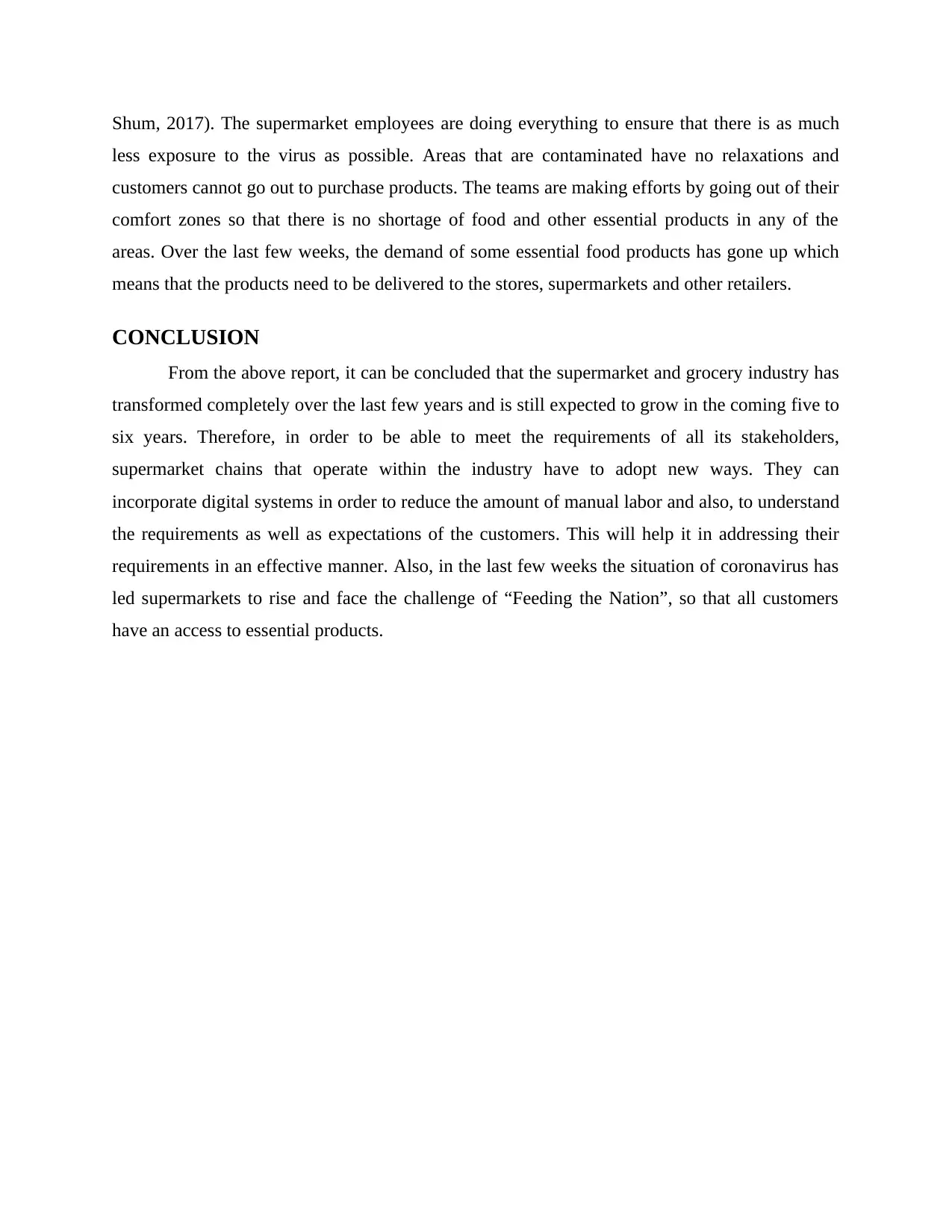
Shum, 2017). The supermarket employees are doing everything to ensure that there is as much
less exposure to the virus as possible. Areas that are contaminated have no relaxations and
customers cannot go out to purchase products. The teams are making efforts by going out of their
comfort zones so that there is no shortage of food and other essential products in any of the
areas. Over the last few weeks, the demand of some essential food products has gone up which
means that the products need to be delivered to the stores, supermarkets and other retailers.
CONCLUSION
From the above report, it can be concluded that the supermarket and grocery industry has
transformed completely over the last few years and is still expected to grow in the coming five to
six years. Therefore, in order to be able to meet the requirements of all its stakeholders,
supermarket chains that operate within the industry have to adopt new ways. They can
incorporate digital systems in order to reduce the amount of manual labor and also, to understand
the requirements as well as expectations of the customers. This will help it in addressing their
requirements in an effective manner. Also, in the last few weeks the situation of coronavirus has
led supermarkets to rise and face the challenge of “Feeding the Nation”, so that all customers
have an access to essential products.
less exposure to the virus as possible. Areas that are contaminated have no relaxations and
customers cannot go out to purchase products. The teams are making efforts by going out of their
comfort zones so that there is no shortage of food and other essential products in any of the
areas. Over the last few weeks, the demand of some essential food products has gone up which
means that the products need to be delivered to the stores, supermarkets and other retailers.
CONCLUSION
From the above report, it can be concluded that the supermarket and grocery industry has
transformed completely over the last few years and is still expected to grow in the coming five to
six years. Therefore, in order to be able to meet the requirements of all its stakeholders,
supermarket chains that operate within the industry have to adopt new ways. They can
incorporate digital systems in order to reduce the amount of manual labor and also, to understand
the requirements as well as expectations of the customers. This will help it in addressing their
requirements in an effective manner. Also, in the last few weeks the situation of coronavirus has
led supermarkets to rise and face the challenge of “Feeding the Nation”, so that all customers
have an access to essential products.
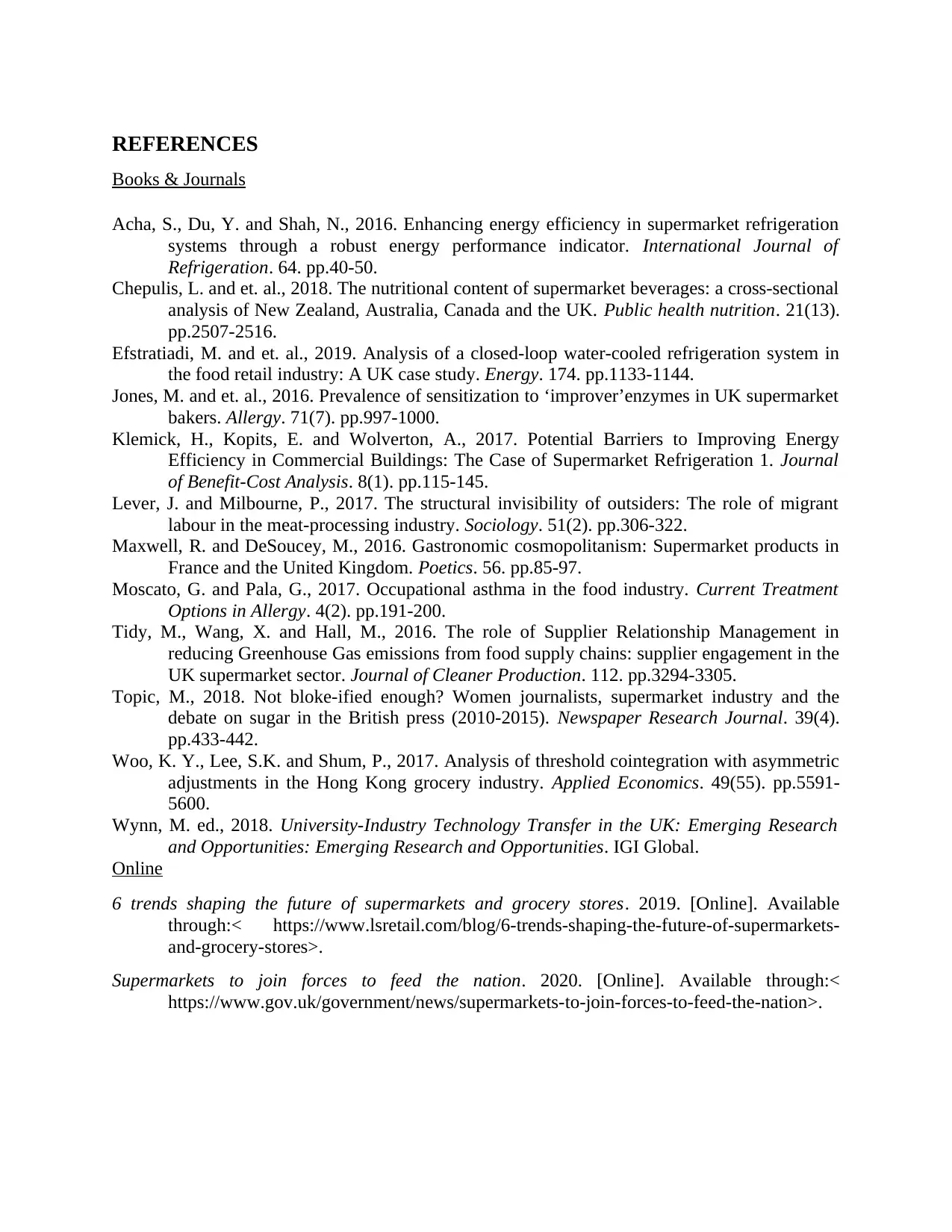
REFERENCES
Books & Journals
Acha, S., Du, Y. and Shah, N., 2016. Enhancing energy efficiency in supermarket refrigeration
systems through a robust energy performance indicator. International Journal of
Refrigeration. 64. pp.40-50.
Chepulis, L. and et. al., 2018. The nutritional content of supermarket beverages: a cross-sectional
analysis of New Zealand, Australia, Canada and the UK. Public health nutrition. 21(13).
pp.2507-2516.
Efstratiadi, M. and et. al., 2019. Analysis of a closed-loop water-cooled refrigeration system in
the food retail industry: A UK case study. Energy. 174. pp.1133-1144.
Jones, M. and et. al., 2016. Prevalence of sensitization to ‘improver’enzymes in UK supermarket
bakers. Allergy. 71(7). pp.997-1000.
Klemick, H., Kopits, E. and Wolverton, A., 2017. Potential Barriers to Improving Energy
Efficiency in Commercial Buildings: The Case of Supermarket Refrigeration 1. Journal
of Benefit-Cost Analysis. 8(1). pp.115-145.
Lever, J. and Milbourne, P., 2017. The structural invisibility of outsiders: The role of migrant
labour in the meat-processing industry. Sociology. 51(2). pp.306-322.
Maxwell, R. and DeSoucey, M., 2016. Gastronomic cosmopolitanism: Supermarket products in
France and the United Kingdom. Poetics. 56. pp.85-97.
Moscato, G. and Pala, G., 2017. Occupational asthma in the food industry. Current Treatment
Options in Allergy. 4(2). pp.191-200.
Tidy, M., Wang, X. and Hall, M., 2016. The role of Supplier Relationship Management in
reducing Greenhouse Gas emissions from food supply chains: supplier engagement in the
UK supermarket sector. Journal of Cleaner Production. 112. pp.3294-3305.
Topic, M., 2018. Not bloke-ified enough? Women journalists, supermarket industry and the
debate on sugar in the British press (2010-2015). Newspaper Research Journal. 39(4).
pp.433-442.
Woo, K. Y., Lee, S.K. and Shum, P., 2017. Analysis of threshold cointegration with asymmetric
adjustments in the Hong Kong grocery industry. Applied Economics. 49(55). pp.5591-
5600.
Wynn, M. ed., 2018. University-Industry Technology Transfer in the UK: Emerging Research
and Opportunities: Emerging Research and Opportunities. IGI Global.
Online
6 trends shaping the future of supermarkets and grocery stores. 2019. [Online]. Available
through:< https://www.lsretail.com/blog/6-trends-shaping-the-future-of-supermarkets-
and-grocery-stores>.
Supermarkets to join forces to feed the nation. 2020. [Online]. Available through:<
https://www.gov.uk/government/news/supermarkets-to-join-forces-to-feed-the-nation>.
Books & Journals
Acha, S., Du, Y. and Shah, N., 2016. Enhancing energy efficiency in supermarket refrigeration
systems through a robust energy performance indicator. International Journal of
Refrigeration. 64. pp.40-50.
Chepulis, L. and et. al., 2018. The nutritional content of supermarket beverages: a cross-sectional
analysis of New Zealand, Australia, Canada and the UK. Public health nutrition. 21(13).
pp.2507-2516.
Efstratiadi, M. and et. al., 2019. Analysis of a closed-loop water-cooled refrigeration system in
the food retail industry: A UK case study. Energy. 174. pp.1133-1144.
Jones, M. and et. al., 2016. Prevalence of sensitization to ‘improver’enzymes in UK supermarket
bakers. Allergy. 71(7). pp.997-1000.
Klemick, H., Kopits, E. and Wolverton, A., 2017. Potential Barriers to Improving Energy
Efficiency in Commercial Buildings: The Case of Supermarket Refrigeration 1. Journal
of Benefit-Cost Analysis. 8(1). pp.115-145.
Lever, J. and Milbourne, P., 2017. The structural invisibility of outsiders: The role of migrant
labour in the meat-processing industry. Sociology. 51(2). pp.306-322.
Maxwell, R. and DeSoucey, M., 2016. Gastronomic cosmopolitanism: Supermarket products in
France and the United Kingdom. Poetics. 56. pp.85-97.
Moscato, G. and Pala, G., 2017. Occupational asthma in the food industry. Current Treatment
Options in Allergy. 4(2). pp.191-200.
Tidy, M., Wang, X. and Hall, M., 2016. The role of Supplier Relationship Management in
reducing Greenhouse Gas emissions from food supply chains: supplier engagement in the
UK supermarket sector. Journal of Cleaner Production. 112. pp.3294-3305.
Topic, M., 2018. Not bloke-ified enough? Women journalists, supermarket industry and the
debate on sugar in the British press (2010-2015). Newspaper Research Journal. 39(4).
pp.433-442.
Woo, K. Y., Lee, S.K. and Shum, P., 2017. Analysis of threshold cointegration with asymmetric
adjustments in the Hong Kong grocery industry. Applied Economics. 49(55). pp.5591-
5600.
Wynn, M. ed., 2018. University-Industry Technology Transfer in the UK: Emerging Research
and Opportunities: Emerging Research and Opportunities. IGI Global.
Online
6 trends shaping the future of supermarkets and grocery stores. 2019. [Online]. Available
through:< https://www.lsretail.com/blog/6-trends-shaping-the-future-of-supermarkets-
and-grocery-stores>.
Supermarkets to join forces to feed the nation. 2020. [Online]. Available through:<
https://www.gov.uk/government/news/supermarkets-to-join-forces-to-feed-the-nation>.
⊘ This is a preview!⊘
Do you want full access?
Subscribe today to unlock all pages.

Trusted by 1+ million students worldwide
1 out of 9
Related Documents
Your All-in-One AI-Powered Toolkit for Academic Success.
+13062052269
info@desklib.com
Available 24*7 on WhatsApp / Email
![[object Object]](/_next/static/media/star-bottom.7253800d.svg)
Unlock your academic potential
Copyright © 2020–2026 A2Z Services. All Rights Reserved. Developed and managed by ZUCOL.





